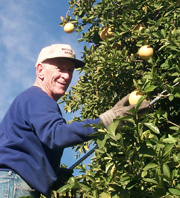Letters
Letters: Share Your Harvest
John Moe
AUGUST 23, 2008
- Volunteer Norm Bell collects citrus fruit
- (Courtesy St. Mary's Food Bank Alliance)
Web Resources
- First Food Bank
- Second Harvest
- Small-Time Growers, Major Cash Cow
- Scarred For Life
- Escape from Burton Island
Related Stories
- Letters: Ocean Pollution and Goodbyes
- Letters: Weekend Soundtrack and Music Mashups
- Letters: Cowboys and Human Rights
- Letters: Survivors of Suicide, Axl Rose, and a Post-Election Mixtape
More From John Moe
We received a few scoldings from listeners for our story about backyard gardeners selling their extra produce to grocery stories and restaurants in the San Francisco Bay Area. Sally Finch of Seattle and Pat Apperson of Pullman, Wash., both wrote to remind us that food banks need your extra veggies.
It turns out the food bank movement was launched in 1967 on just this idea. It began in Phoenix, at what's now St. Mary's Food Bank Alliance.
St. Mary's President and CEO Terry Shannon: It's a terrible thing to see food left in a field after a harvest because it didn't get picked up by the machines or the workers. Back in 1967, John van Hengel, who founded St. Mary's and is recognized internationally as the father of food banking, began working with folks in the neighborhood and farmers to be able to accept surplus food from their fields to get it into the food bank and out to the people in need.
John Moe: And in your part of the country, what kind of food what is that?
Shannon: We are a produce rich state in Arizona. Obviously the citrus side of things is a very huge component. If you take the lemons, and oranges and grapefruits this past growing season we had 1.4 million pounds donated through the gleaning efforts of our community. So during that time, we're actually sending three to four semi-loads to our sister food banks all over the West Coast, and in turn we get their surplus during their harvesting season so it could be potatoes from Idaho, apples from Washington.
Moe: It's kind of like taking your extra produce over to your neighbor's house.
Shannon: On a much grander scale.
Moe: So if our listeners have an embarrassment of zucchini, an overwhelming amount of tomatoes--
Shannon: Bring them down! We can absolutely put them to work in the community.
A lot of you wrote to thank us for Karen Williams' story on our show a few weeks ago. Williams told about her lifelong struggle with severe scarring that covered her body after a childhood bout with chicken pox.
This is one of the most powerful pieces I have heard on the radio, period. You touched on one of my worst secret guilts, something that shames and horrifies me about myself: the way that I recoil when I see someone whose face is scarred. This is a double secret guilt because I am a nurse. While I would never be overtly cruel to anyone, I am covertly cruel in that the horror I feel does not allow me to see the person beneath.
Karen Williams is an amazing woman whose beauty is deep and wide. Thanks to you for broadcasting her story in her own words and thanks to Karen for sharing her experiences in such a powerful way.
Keta Hodgson
West Hollywood, Calif.
Our story "Escape from Burton Island" about Brooklynite David Maxon's attempt to get back to nature got a mixed reaction. Emil Dansker of Cincinatti called it "a waste of precious time," but Linnea Preston of Seattle wrote to say it reminded her of the time she was in the Peace corps in Nepal, craving American food.
Listening to this story transported me back to my time in the Peace Corps in Nepal. When I was in training and then later when I'd get together with the other volunteers in my group, we'd start talking about what we missed about being home in the States. Oddly enough it wasn't things like electricity or running water (though a hot bath was something we all dreamed of) but different types of food. During one Christmas season, we were all invited to our program manager's house in Kathmandu for dinner. She had commissary privileges, so we pigged out on Doritos, salad, spaghetti, ice cream, M&Ms and other delectables from home. It was a blessed break from our usual diet of dal bhat (rice and lentils). I remember eating so much I got sick that night, but oh, the memory of that delicious dinner stayed with me throughout the rest of my time in Nepal. The idea of not being able to have something, even the most insignificant things, makes a person n crazy over time!
I loved my time in Nepal--toughest job you'll ever love and all that--but the idea of going home (or having things from home) was often near, and sometimes the Benadryl or Actifed was essential for sleeping through the rats and giant spiders that shared my room...
Linnea Preston
Seattle, Wash.
-
- Music Bridge:
- Until the Real Thing Comes Along
- Artist: B. Fleischmann
- CD: Welcome Tourist (Morr)







Comments
Comment | Refresh
Post a Comment: Please be civil, brief and relevant.
Email addresses are never displayed, but they are required to confirm your comments. All comments are moderated. Weekend America reserves the right to edit any comments on this site and to read them on the air if they are extra-interesting. Please read the Comment Guidelines before posting.
You must be 13 or over to submit information to American Public Media. The information entered into this form will not be used to send unsolicited email and will not be sold to a third party. For more information see Terms and Conditions and Privacy Policy.